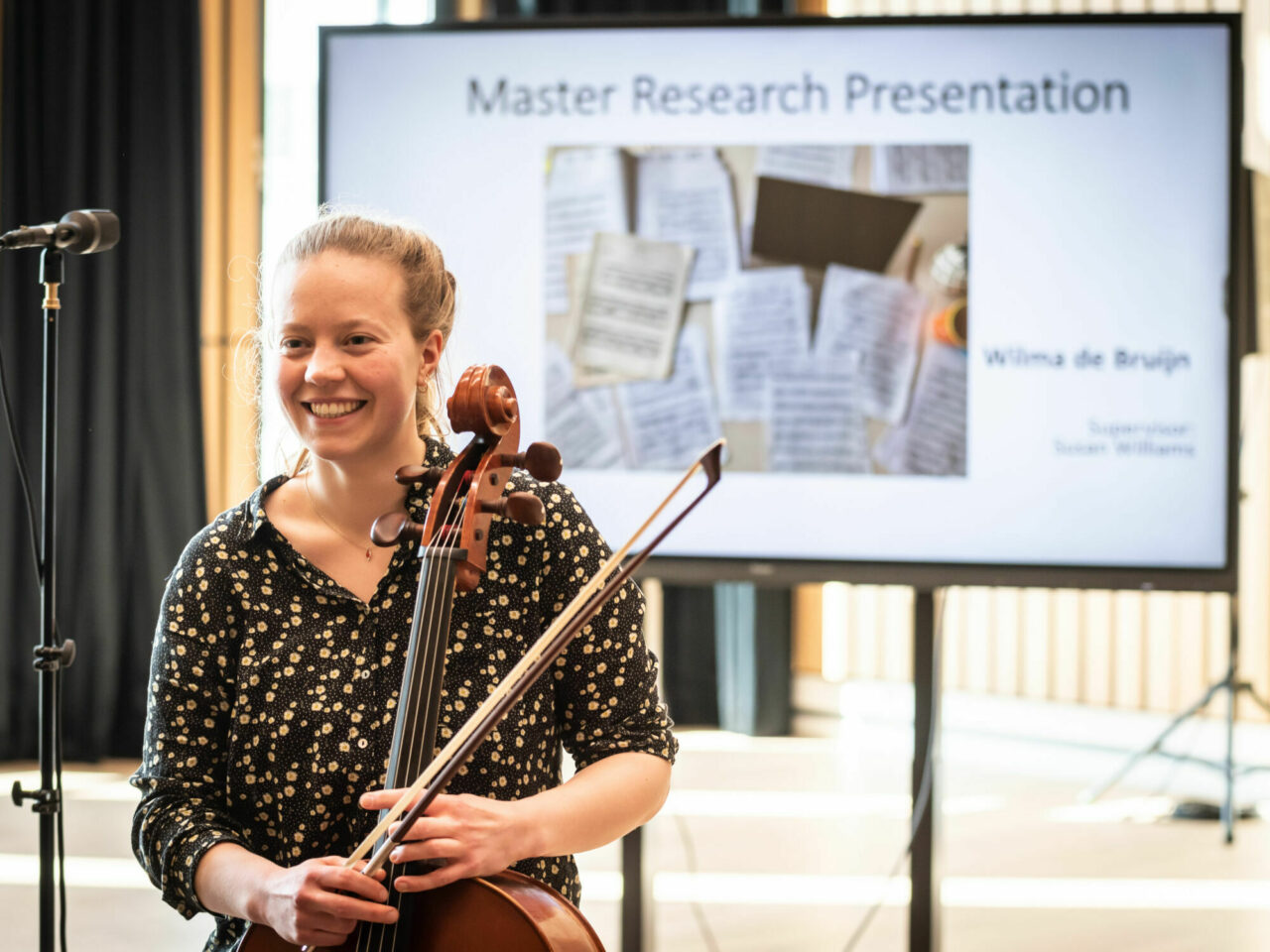Kathryn Cok, PhD – Head of Master Research
The 2022 Master Research Symposium was a showcase of the Master Research Programme of the Royal Conservatoire. Master students from the departments of Classical Music, Jazz, Early Music, Vocal Studies, Theory of Music and New Audiences and Innovative Practice (NAIP) demonstrated the outcome of two years of dedicated work on their individual research projects in written and multimedia format. The Master Research Programme of the Royal Conservatoire is an intensive course aimed at developing the artistic, entrepreneurship, and research skills of our individual students, enabling them to continue their development in the arts after their studies, be it in a PhD program, or in another capacity in the world of performance and beyond. As can be expected from a conservatoire with students from all over the globe, this symposium contained a variety of fascinating research topics and presentations. As Head of Master Research, this week is one that I am especially proud of as we witnessed live and celebrated, the creative output of our students. The festive, energetic atmosphere of this year was particularly apparent after two online symposia, due to the Covid epidemic.
Reflections from students:
Presenting my Master Research on Jacob Kremberg's collection containing intabulations for viola da gamba during this year's Symposium was an exciting and rewarding experience for me.
I was positively surprised that so many people came to learn more about this little-known repertoire for viola da gamba. This atmosphere of kind and sincere interest from the listeners and the committee helped me a lot in overcoming my fear of speaking in a foreign language.
Heading towards the Master Research Symposium week 2022 was less daunting as I had been fortunate to be included as one of the student panel members last year. Although it was online, it gave me a sense of what was to be expected.
It was a relief to know that the presentations this year were to be Live. The new studios of Amare provided a welcoming environment with a great set-up: beautiful acoustics, video screens, audio, tables, computer cables, music stands and of course seating for the examining panel and listeners! I received help with setting up and was ready to launch by the time the presentation was due to begin. In addition, I was given a pleasant surprise by having in attendance VIP’s from Stichting De Zaaier, who had so generously provided a grant for my research.
Victor Hugo, the French poet and novelist once said,
“Music expresses that which cannot be said and on which it is impossible to be silent."
Music Research however stimulates the need to express it in words. The symposium encourages the presenter to summarise as eloquently as possible two years of living research into thirty minutes! To deliver my findings through words, and the music through my instrument and communicate it with listeners was both challenging and gratifying and I am forever grateful to have had this experience.
The Panel were both encouraging and HUMAN!
Thank you, The Royal Conservatoire of The Hague.
I was very impressed to walk into the conservatoire and see all these young people engaged in the event. You could feel the energy in the air not only in the studios, but also in the corridors and in the relaxation areas. Every friend and colleague I met was an opportunity to exchange ideas and suggestions for everyone's own exhibition, and from there long discussions began on the topics of the various research. Everyone was passionate and involved to the topic of their research and this passion was contagious for me and filled me with curiosity and a desire to expand and continue my research even further.
Having the opportunity to present my research in this context full of passion, curiosity and dedication made me proud of my work and eager to further explore it.
When you want to do a Master study at the Royal Conservatoire, there is a moment in the application process where you’ll have to submit a proposal for your master research. A very important moment, as this will be the start of something that you’ll be working on for the next two years. Did someone else do research about this already? Is this subject relevant enough? Does this add to all the work that has been done before me? A lot of questions that can go through your head while trying to come up with a fitting research title. But during those two years you will find out, together with your supervisor and master circle leader, that there is still a lot to discover that will result in something valuable.
For me personally, and I assume also for my fellow M2 students, the couple of weeks before the presentation were intense. Double checking all the texts, if I didn’t forget something, if I really mentioned everything that I wanted to say. But on the other hand, it is also a good moment to reflect on what has happened in those two years. Starting with just a musical score, I ended up with multiple new editions, professional recordings, and materials from many sources throughout Europe, that gave a whole overview of the life of an, until now, unknown Dutch composer, Ludovicus Mirandolle.
Research takes a lot of time and patience but is also something you cannot do alone. Libraries and archives, performers, specialists, and the many researchers that worked before you. Naming only a few great connections to have as a graduating Master student, about to step into their professional musical careers.
Your final research presentation lets you decide what punctuation to use after your research. Will you use a full stop, a comma, or perhaps another question mark? Either way, you finished something of great importance. For yourself, your colleagues, and a next generation of researchers.
